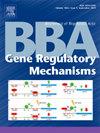DUSP1 protein's impact on breast cancer: Anticancer response and sensitivity to cisplatin
IF 3.1
3区 生物学
Q3 BIOCHEMISTRY & MOLECULAR BIOLOGY
Biochimica et Biophysica Acta-Gene Regulatory Mechanisms
Pub Date : 2025-06-25
DOI:10.1016/j.bbagrm.2025.195103
引用次数: 0
Abstract
Dual-Specificity Phosphatase 1 (DUSP1) modulates the activity of members of the Mitogen-Activated Protein Kinase (MAPK) family, including p38, JNK, and ERK1/2, which affects various cellular functions in cancer. Moreover, DUSP1 is known to influence the outcomes of cancer chemotherapy. This study aimed to reduce DUSP1 protein expression using CRISPR/Cas9 and siRNA and assess its effects on cell proliferation, migration, and tumor growth potential in triple-negative breast cancer (TNBC) cells. We examined the expression levels of p38, JNK, and ERK1/2, along with their phosphorylated forms, and investigated DUSP1's influence to cisplatin sensitivity. Our findings revealed that the downregulation of DUSP1 expression inhibited the proliferation, migration, and tumor growth potential of TNBC cells. Additionally, BCI, an inhibitor of DUSP1/6, demonstrated anti-proliferative effects on these cells. Decreasing the expression of DUSP1 increased the phosphorylation ratio of p38 and JNK, but not ERK1/2. Moreover, the anticancer response induced by cisplatin was enhanced by reducing DUSP1 expression or by treating the cells with BCI. Notably, cisplatin treatment increased p38 phosphorylation, which was significantly augmented by reduced DUSP1 expression. We also demonstrated that the DUSP1 inhibition-induced anticancer response in these cells predominantly relied on p38 activity. These findings contribute to a better understanding of the role of DUSP1 in breast cancer and offer insights into potential therapeutic strategies targeting DUSP1 to enhance the efficacy of cisplatin treatment. Our study highlights that decreased DUSP1 protein expression and activity mediates an anticancer response and increases the sensitivity of MDA-MB231 cells to cisplatin by regulating p38.
DUSP1蛋白对乳腺癌的影响:抗癌反应和对顺铂的敏感性
双特异性磷酸酶1 (DUSP1)调节丝裂原活化蛋白激酶(MAPK)家族成员的活性,包括p38、JNK和ERK1/2,影响癌症中的各种细胞功能。此外,已知DUSP1会影响癌症化疗的结果。本研究旨在利用CRISPR/Cas9和siRNA降低DUSP1蛋白表达,并评估其对三阴性乳腺癌(TNBC)细胞增殖、迁移和肿瘤生长潜力的影响。我们检测了p38、JNK和ERK1/2及其磷酸化形式的表达水平,并研究了DUSP1对顺铂敏感性的影响。我们的研究结果表明,下调DUSP1的表达抑制了TNBC细胞的增殖、迁移和肿瘤生长潜能。此外,DUSP1/6的抑制剂BCI对这些细胞具有抗增殖作用。降低DUSP1的表达增加了p38和JNK的磷酸化比例,但没有增加ERK1/2的磷酸化比例。此外,顺铂诱导的抗癌反应可通过降低DUSP1表达或BCI处理细胞而增强。值得注意的是,顺铂治疗增加了p38磷酸化,而DUSP1表达的降低则显著增强了p38磷酸化。我们还证明了DUSP1抑制诱导的这些细胞的抗癌反应主要依赖于p38活性。这些发现有助于更好地了解DUSP1在乳腺癌中的作用,并为针对DUSP1的潜在治疗策略提供见解,以提高顺铂治疗的疗效。我们的研究强调,DUSP1蛋白表达和活性的降低介导抗癌反应,并通过调节p38增加MDA-MB231细胞对顺铂的敏感性。
本文章由计算机程序翻译,如有差异,请以英文原文为准。
求助全文
约1分钟内获得全文
求助全文
来源期刊
CiteScore
9.20
自引率
2.10%
发文量
63
审稿时长
44 days
期刊介绍:
BBA Gene Regulatory Mechanisms includes reports that describe novel insights into mechanisms of transcriptional, post-transcriptional and translational gene regulation. Special emphasis is placed on papers that identify epigenetic mechanisms of gene regulation, including chromatin, modification, and remodeling. This section also encompasses mechanistic studies of regulatory proteins and protein complexes; regulatory or mechanistic aspects of RNA processing; regulation of expression by small RNAs; genomic analysis of gene expression patterns; and modeling of gene regulatory pathways. Papers describing gene promoters, enhancers, silencers or other regulatory DNA regions must incorporate significant functions studies.

 求助内容:
求助内容: 应助结果提醒方式:
应助结果提醒方式:


